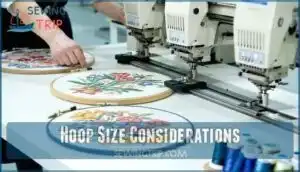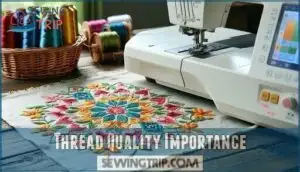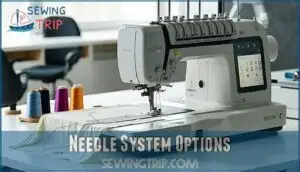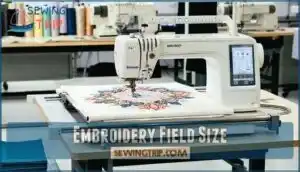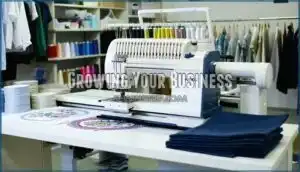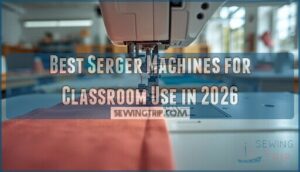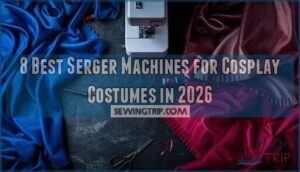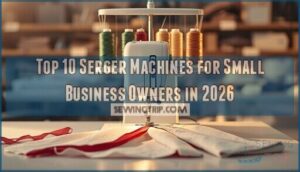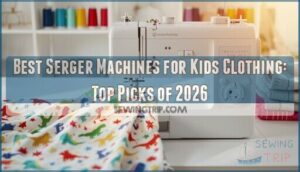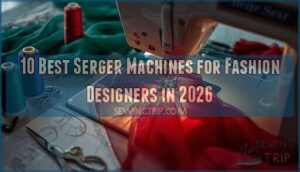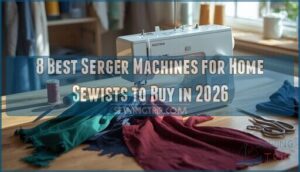This site is supported by our readers. We may earn a commission, at no cost to you, if you purchase through links.
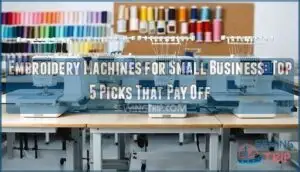
Start with machines offering 4×4 inch hoops for basic work, then upgrade to larger formats as orders grow. Brother and Janome models deliver reliable performance without breaking the bank.
Consider thread capacity, stitch speed, and built-in designs when comparing options. Multi-needle machines cut production time dramatically but cost more upfront.
Single-needle units work fine for startups with lighter volume. The sweet spot lies between professional features and affordable pricing.
Smart machine selection determines whether you’ll struggle with limitations or scale confidently toward bigger profits.
Table Of Contents
Key Takeaways
- Start with your business goals and budget first – You’ll avoid costly mistakes by defining your production needs, target market, and realistic revenue projections before getting distracted by flashy features you don’t actually need.
- Choose between single-needle and multi-needle based on volume – You can handle startup orders with affordable single-needle machines like the Brother SE1900 ($500), but you’ll need multi-needle machines like the Janome MB-7 to cut production time by 75% as orders grow.
- Focus on hoop size, thread capacity, and stitch speed – You’ll want 4×4 inch hoops for basic logos and larger formats for complex designs, while considering thread quality and machine speed to match your production demands.
- Expect 30-60% profit margins with the right approach – You can build a profitable business in a market projected to reach $2.62 billion by 2033, but success depends on smart pricing strategies, efficient operations, and investing in quality machines that won’t break down.
Choosing Embroidery Machines
Choosing the right embroidery machine starts with understanding your business goals and matching them to the machine’s features.
You’ll want a balance between cost, functionality, and future growth to guarantee your investment pays off.
Define Your Business Goals
Before diving into machine specs, map out your business objectives.
Before you chase features, chase clarity on what your business actually needs.
Will you focus on custom apparel, promotional products, or both?
Conduct market research to understand customer needs in your area.
Set realistic revenue projections for your first year.
Your growth strategies should align with your target market.
Smart small business embroidery ventures start with clear goals, not shiny equipment.
Understanding the best embroidery options is essential for making informed decisions about equipment and supplies, and is a key part of informed decisions.
Stick to Your Budget
Setting your embroidery machine budget isn’t just about sticker price—it’s smart financial management.
Factor in thread costs, maintenance, and software when doing price comparison shopping.
Commercial embroidery machines range from $500 to $15,000, so expense tracking matters.
Don’t let flashy features derail your cost control. Your small business embroidery investment should match your actual production needs, not your wishlist.
Understanding current machine price trends is essential for making informed decisions.
Consider Add-Ons
Smart add-ons can transform your embroidery machines for small business into profit powerhouses.
Don’t overlook these game-changing extras that separate successful custom embroidery operations from struggling ones:
- Stabilizer Options and hoop accessories for different fabric types
- Thread Variety packs and machine upgrades for enhanced capabilities
- Design Software and embroidery equipment that streamlines your workflow
These investments pay dividends.
Top 5 Embroidery Machines
You’ve narrowed down your requirements and budget, so now it’s time to examine the machines that’ll actually grow your business.
These five embroidery machines offer the best combination of reliability, features, and value for small business owners who need consistent results without breaking the bank.
1. Janome commercial embroidery sewing machine
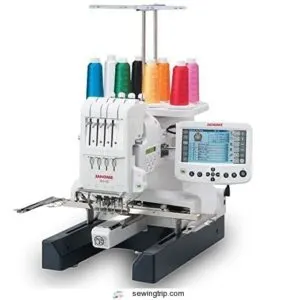
Looking for a machine that handles both everyday sewing and serious embroidery work? The Janome MB-4S delivers commercial-grade performance in your home studio.
You’ll get four needles, 800 stitches per minute, and a generous 5.7-inch remote screen that makes design editing effortless. The extra-large bobbin means fewer thread changes, while built-in LED lighting keeps your workspace bright.
With 50 designs and USB connectivity, you can tackle custom orders or personal projects. It’s the workhorse that grows with your business ambitions.
When selecting a commercial embroidery machine, consider the key factors that impact production efficiency and quality.
Best For: Small business owners or home hobbyists who need a versatile embroidery machine with commercial-grade capabilities.
- Steep learning curve requiring external tutorials for setup and design loading.
- Manual lacks clear guidance on USB design import process.
- Did not meet user expectations for overall performance and ease of use.
- 4-needle design increases efficiency for multi-color embroidery projects.
- USB connectivity and built-in designs support easy customization.
- Large bobbin and bright LED lighting enhance productivity and ease of use.
2. Bernette sewing and embroidery machine
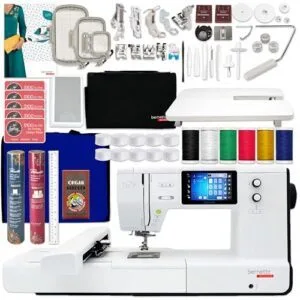
With precision engineering and Swiss heritage backing it, the Bernette B79 delivers professional results without breaking your budget.
You’ll get over 200 built-in embroidery designs, plus software worth $598 that lets you create custom patterns.
The 5-inch touchscreen makes navigation smooth, while three hoop sizes handle everything from small logos to large back designs.
At roughly $2,500, it’s substantially cheaper than comparable Bernina models but maintains the same reliability.
This machine transforms your creative ideas into profitable embroidery work that clients actually want to pay for, making it a great tool for those looking for custom patterns.
Best For: Small embroidery businesses and creative entrepreneurs seeking a cost-effective, professional-grade machine for custom designs.
- High-speed stitching and precision for efficient and accurate projects.
- Includes $598 embroidery software and 500 commercial-use design access cards.
- Affordable alternative to higher-end Bernina models with comparable quality.
- Reports of missing tools and software in some deliveries.
- Occasional timing and stitching quality issues.
- Limited to a 5-inch color touchscreen, which might feel small for some users.
3. Janome multi needle embroidery machine
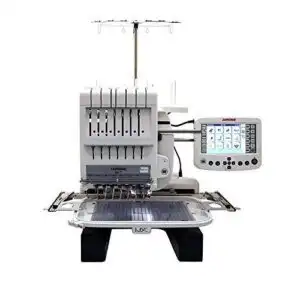
The Janome MB-7’s seven-needle configuration cuts thread changes by 75%, turning tedious color swaps into smooth sailing.
You’ll handle multiple thread colors simultaneously, bridging the gap between home hobby and commercial production.
With hoop sizes up to 9.46" x 7.88" and professional-grade speed, this machine delivers 50-60% productivity gains over single-needle alternatives.
The touchscreen interface keeps design management simple, while automatic thread trimming saves precious minutes.
At $3,500-$5,000, it’s your ticket to serious embroidery business without industrial-level investment.
Best For: Small to medium-sized embroidery businesses looking for efficient, cost-effective production with professional-grade capabilities.
- Seven-needle configuration reduces thread changes by 75%.
- Touchscreen interface and built-in design editing simplify management.
- Offers 50-60% productivity gains over single-needle machines.
- Returned item refurbished due to a previous hardware issue (broken sensor board).
- Accessories may not be original and come in generic packaging.
- Higher upfront cost compared to single-needle embroidery machines.
4. Brother computerized sewing embroidery machine
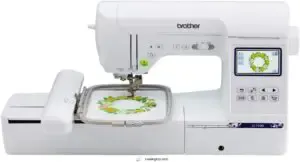
Balancing affordability with professional capability, the Brother SE1900 delivers impressive value for growing businesses.
You’ll get 240 sewing stitches plus 138 embroidery designs in one versatile machine.
The 5" x 7" embroidery field handles most commercial projects, while the 3.2" touchscreen makes design editing straightforward.
At under $500, it won’t break your startup budget, and the automatic needle threader saves time during busy production runs.
Sure, it’s louder than premium models, but the results speak volumes about its commercial potential and overall professional capability.
Best For: Small business owners, embroidery enthusiasts, and startup entrepreneurs looking for an affordable and versatile sewing and embroidery machine.
- 240 sewing stitches and 138 embroidery designs deliver versatility for various projects.
- Large 5" x 7" embroidery field supports commercial-grade designs.
- Affordable pricing makes it accessible for startups on a budget.
- Can be loud during embroidery operation compared to premium machines.
- Does not include an extension table or USB stick for design transfer.
- Requires proper threading technique for consistent automatic threader use.
5. Singer Computerized Sewing Embroidery Machine
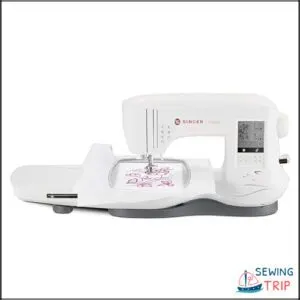
The Singer SE9180 strikes a sweet spot between functionality and affordability for small businesses.
You’ll get 250 built-in stitches plus 200 embroidery designs with two hoop sizes to tackle various projects.
The LCD touchscreen makes navigation straightforward, while automatic features like needle threading and tension adjustment keep you focused on creating rather than troubleshooting.
At around $500, it’s budget-friendly without sacrificing quality.
However, some users report occasional motor issues and the black-and-white screen can make color selection tricky during complex embroidery work, which may require more troubleshooting.
Best For: Home crafters and small business owners looking for a versatile and affordable sewing and embroidery machine.
- Offers 250 built-in stitches and 200 embroidery designs for diverse projects.
- Includes automatic needle threading and tension adjustment for ease of use.
- Budget-friendly option delivering professional-quality results.
- Black-and-white screen complicates color selection during embroidery.
- Occasional motor issues reported by users.
- Bulky design may be inconvenient for smaller workspaces.
Key Machine Features
When you’re shopping for an embroidery machine, you’ll quickly discover that not all features are created equal—some can make or break your business efficiency.
Understanding the key specifications like hoop size, needle systems, and embroidery field dimensions will help you choose a machine that matches your production needs and budget constraints.
Hoop Size Considerations
Choosing the right hoop size for your embroidery machines transforms your small business capabilities.
Your embroidery area determines project size limits—4×4 inches handles basic logos while larger hoops tackle complex designs.
Consider fabric thickness when selecting embroidery hoops, as heavier materials need secure hoop stabilization.
Machine compatibility varies, so match your equipment’s specifications with design complexity requirements for superior results.
Understanding pricing strategies is also essential for balancing profitability with customer satisfaction.
Thread Quality Importance
Premium embroidery threads transform your business reputation overnight.
**Premium threads separate the professionals from the amateurs—your reputation depends on this choice.
Thread durability determines whether customers return or complain about fading designs.
High-quality thread guarantees superior stitch appearance while boosting machine efficiency through fewer breakages.
Color fastness separates amateur from professional work.
Different fiber types suit various projects—polyester excels commercially while rayon shines decoratively.
Thread thickness affects design precision substantially.
Using premium threads guarantees consistent stitch quality across all your projects, which can be achieved by selecting the right thread for the job, and understanding why high-quality thread matters, as explained in this consistent stitch quality guide, to ensure professional work.
Needle System Options
Your needle system choice directly impacts how your embroidery machines handle different fabrics and designs.
Single-needle systems work perfectly for small business startups, while multi-needle embroidery machines boost production speed substantially. You can explore a complete rotary system online.
- Rotary vs Flatbed: Rotary systems excel with thick materials; flatbed handles delicate fabrics better
- Needle Size Impact: Smaller needles prevent fabric damage; larger needles work with heavy threads
- Thread Tension Control: Automatic systems reduce setup time and prevent thread breaks
- Specialty Needle Types: Ballpoint needles for knits; sharp needles for woven fabrics
Embroidery Field Size
When selecting embroidery machines for your small business, embroidery field size directly impacts your project versatility and machine capabilities.
A larger embroidery area handles complex designs without repositioning, while smaller fields limit design complexity and fabric thickness options.
Consider your typical projects—larger embroidery machine embroidery fields mean fewer hoop limitations and greater creative freedom for diverse customer demands, which can lead to more project versatility.
Growing Your Business
You’ve got your embroidery machine, but now you need to turn that investment into steady profit.
The embroidery industry offers impressive margins of 60% or higher, and with the right approach, you can tap into a market that’s projected to reach $2.62 billion by 2033, a significant opportunity for growth.
Market Trends and Opportunities
The embroidery market’s hitting $7.88 billion by 2034, and you’re positioned to grab your slice.
Customization demand is skyrocketing as consumers want unique products. Digital design capabilities are opening doors you never imagined.
Market expansion in small business segments shows 6.1% growth annually. Your embroidery machines aren’t just equipment—they’re profit-generating powerhouses when backed by solid market research, driven by customization demand.
Customization and Personalization
Today’s customers crave one-of-a-kind items that reflect their personality.
Custom embroidery transforms ordinary products into personalized gifts that build customer loyalty. Your embroidery machines become profit generators when you offer unique designs and branding options.
Product differentiation through customization sets you apart from competitors. Smart embroidery digitizing expands your creative possibilities and revenue streams substantially, leading to increased customer loyalty.
Investing in Quality Machines
When you’re building an embroidery business, cheap machines become expensive mistakes.
Quality embroidery machines deliver long-term value through superior durability matters—they’ll handle thousands of designs without breaking down.
Brand reputation signals precision embroidery capabilities that keep customers coming back.
Smart investment means avoiding replacements that drain profitability, and your machine choice determines whether you’re constantly fixing problems or consistently growing revenue.
Many businesses find success using a commercial embroidery machine.
Achieving High Profit Margins
Smart embroidery business owners know profit margins between 30-60% aren’t just possible—they’re achievable with the right approach.
Your pricing strategies should reflect your value proposition while targeting your specific audience.
Focus on cost reduction through efficient production and quality embroidery machines.
Conducting market research helps understand customer preferences.
Combine strategic marketing tactics with niche targeting, and you’ll transform your small business into a profitable powerhouse.
Frequently Asked Questions (FAQs)
Should you buy a commercial embroidery machine for home business?
Don’t put all your eggs in one basket—commercial machines cost thousands but deliver durability and speed.
If you’re processing high volumes daily, they’re worth it.
Otherwise, quality home machines handle most small business needs perfectly.
What is the best embroidery machine for small business?
For most small businesses, the Janone MB-4S delivers the perfect balance of professional quality and manageable investment.
You’ll get four needles, 800 SPM speed, and commercial-grade reliability without breaking your budget or overwhelming your workspace.
Is it profitable to start a small business with embroidery?
Yes, you can build a profitable embroidery business. With profit margins often exceeding 60% and low material costs, you’ll generate strong returns once you establish your customer base and efficient operations.
How to start an embroidery business?
Planting seeds in entrepreneurial soil requires careful preparation.
First, you’ll research your target market, secure quality embroidery equipment, develop pricing strategies, create a business plan, obtain necessary licenses, and establish marketing channels to attract customers.
How much does a brother embroidery machine cost?
Brother embroidery machines range from $230 to $500 for home models like the XR9550, PE535, and SE You’ll find budget-friendly options starting around $230, while feature-rich models cost up to $500 for small businesses.
What software compatibility do embroidery machines require?
Most embroidery machines work with popular design software like Embird, Hatch, or Brother’s PE-Design.
You’ll need software that reads common formats like PES, DST, or JEF to transfer your designs seamlessly.
How often should embroidery machines be serviced?
A well-oiled machine versus a broken-down workhorse.
You’ll need professional servicing every 6-12 months with heavy use, annually for moderate use.
Clean daily, oil weekly, and watch for tension issues to keep your machine humming smoothly.
What training is needed for embroidery operators?
You’ll need basic machine operation, threading techniques, hoop positioning, and design file management.
Most manufacturers offer online tutorials, while local dealers provide hands-on workshops.
Practice with sample fabrics builds confidence quickly, and utilizing these resources can lead to better management of your machine and projects.
How much space do commercial embroidery setups need?
Plan for at least 8×10 feet of floor space for a single-head commercial machine.
You’ll need extra room for thread storage, cutting tables, and operator movement.
Multi-head setups require substantially more square footage.
What are common embroidery machine maintenance costs?
Machine maintenance typically costs $500-2,000 annually for small businesses.
You’ll spend on regular servicing, replacement parts like needles and bobbins, thread tension adjustments, and occasional repairs to keep your equipment running smoothly.
Conclusion
Like David choosing the right stone for Goliath, selecting the perfect embroidery machines for small business requires precision and strategy.
You’ve seen how Brother’s reliability, Janome’s commercial strength, and Bernette’s versatility can transform your operations.
Don’t let analysis paralysis hold you back – start with a machine that matches your current needs and budget.
Your business growth depends on making this pivotal investment decision.
The right embroidery machine won’t just meet today’s demands; it’ll fuel tomorrow’s success.
- https://www.marketresearchintellect.com/product/global-embroidery-machine-market-size-and-forecast/
- https://www.precedenceresearch.com/embroidery-machine-market
- https://www.mordorintelligence.com/industry-reports/embroidery-machine-market
- https://www.ibisworld.com/united-states/industry/commercial-embroidery-services/5325/
- https://www.printful.com/ca/blog/how-to-design-a-logo-for-embroidery

